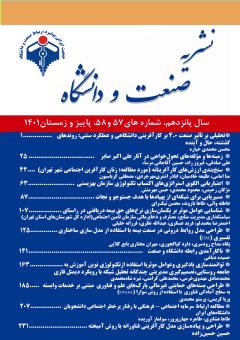ناکارآمدی رابطه دانشگاه و صنعت
محورهای موضوعی : Special
1 - استادیار، دانشکده علوم اجتماعی، دانشگاه علامه طباطبائی، تهران، ایران
کلید واژه: صنعت / بازار و دانشگاه, اشتغال فارغ التحصیلان, علوم اجتماعی. ,
چکیده مقاله :
مقاله حاضر به رصد وضعیت شغلی فارغ التحصیلان دانشگاهی و شناسایی مهمترین چالش ها و مشکلات آنها در مسیر کاریابی در بازه زمانی 10 سال اخیر می پردازد. رویکرد تحقیق ترکیبی است. در فاز اول تحقیق، پرسشنامه آنلاین طراحی شد و به جامعه آماری 2088 نفری ارائه شد و 268 نفر از آنها در پیمایش شرکت کردند. یافته های توصیفی حاصل از پیمایش نشان می دهد که، 68.3 درصد از فارغ التحصیلان که از این تعداد 35.1 درصد از آنها شغل دائم دولتی و کمترین تعداد معادل با 6.3 درصد خود اشتغال بودند و 31 درصد هم بیکار و در جستجوی کار می باشند. 47 درصد از پاسخگویان معتقد بودند که در یافتن شغل با مشکلات زیادی مواجه بودند و مهمترین مشکلاتی که شناسایی شده به گزینش ناعادلانه در بازار کار، عدم تعامل دانشگاه و بازار، ابهام ماهوی و کارکردی برای کارفرمایان، مشکلات فردی و ناپایداری بازار کار در کشور، باز می گردد. یافته های تحقیق در فاز دوم، حاکی از قطع ارتباط دانش آموختگان دانشگاهی با دانشگاه و عدم بهره مندی آنها از شبکه روابط حمایتی اساتید و متخصصان پس از اتمام دوره تحصیلی، تقاضا محور نبودن رشته های دانشگاهی و عدم آشنایی بازارکار با پتانسیل های فارغ التحصیلان دانشگاهی است که موجب گسست پیوند میان دانشگاه و بازار کار می شود. مشکل دیگر به تعریف محتواهای درسی به صورت نظری به ویژه در اکثر رشته های علوم اجتماعی و انسانی باز می گردد که موجب شده محتواهای آموزشی فاقد دوره های کارآموزی و تجربه کردن کار در میدان عمل باشد
This article focuses on the employment status after graduation (2012-2022) of the Faculty of Social Sciences of Allameh Tabatabai University. It identifies the most critical challenges they face in seeking a job. The research approach is combined and based on the survey method in the first stage, as well as open question coding and theme extraction with the thematic analysis method. In the first phase of the research, an online questionnaire was designed and presented to the statistical population of 2088 people, and 268 of them participated in the survey. Descriptive findings show 68.3% of the graduates, of which 35.1% had permanent government jobs, the lowest number, equal to 6.3%, were self-employed, and 31% were unemployed and looking for work. 47% of the respondents believed they faced many problems finding a job. The most significant problems identified included unfair selection in the labor market, lack of interaction between the university and the market and industry, substantive and functional ambiguity for employers, personal problems, and The instability of the labor market in the country.
Additionally, the findings indicate the disconnection of university graduates with the university and their lack of benefit from the support network of professors and specialists after graduation, the lack of demand-oriented academic courses, and the lack of familiarity with the labor market. After the students' graduation, the link between them and the university became lost. Another problem refers to defining the course contents in a theoretical way, especially in the majority of social sciences
